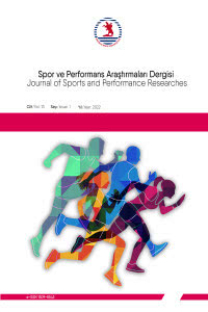ELİT ERKEK VE KADIN HALTERCİLERİN DÜNYA VE AVRUPA ŞAMPİYONALARI YARIŞMA KALDIRIŞLARINDAKİ BAŞARI DÜZEYLERİNİN ANALİZİ
Halter, halterci, koparma, olimpik halter, silkme
ANALYSIS OF THE SUCCESS LEVELS OF ELITE MALE AND FEMALE WEIGHTLIFTERS IN COMPETITION ATTEMPTS OF WORLD AND EUROPEAN CHAMPIONSHIPS
Clean and jerk, Olympic weightlifting, Snatch, Weightlifter, Weightlifting,
___
- Nideffer RM, Sagal M-S, Lowry M, Bond J. Identifying and developing world class performers, The practice of sport psychology, 2001: 129-44.
- Hopkins WG, Hewson DJ. Variability of competitive performance of distance runners, Medicine and Science in Sports and Exercise, 2001; 33 (9): 1588-92.
- McGuigan MR, Kane MK. Reliability of performance of elite Olympic weightlifters, The Journal of Strength & Conditioning Research, 2004; 18 (3): 650-53.
- Pyne DB, Trewin CB, Hopkins WG. Progression and variability of competitive performance of Olympic swimmers, Journal of sports sciences, 2004; 22 (7): 613-20.
- Mendez-Villanueva A, Mujika I, Bishop D. Variability of competitive performance assessment of elite surfboard riders, The Journal of Strength & Conditioning Research, 2010; 24 (1): 135-39.
- Paton CD, Hopkins WG. Variation in performance of elite cyclists from race to race, European Journal of Sport Science, 2006; 6 (01): 25-31.
- İnce İ, Akkuş H. Posture analysis of Turkish National Weightlifting Team, Journal of Human Sciences, 2018; 15 (2): 739-46.
- Malcata RM, Hopkins WG. Variability of Competitive Performance of Elite Athletes: A Systematic Review, Sports Medicine, 2014; 44 (12): 1763-74. doi: 10.1007/s40279-014-0239-x.
- Szabó AS. Some special biomechanical questions of olympic weightlifting, Int. Quarterly of Sport Science,(2). 2009: 57-60.
- İnce İ, Şentürk A. Türk Milli Erkek Halter Takımı'nın Müsabaka Kaldırışlarındaki Başarı Oranlarının İlk Üç Dereceye Giren Ülkelerle Karşılaştırılması, Sportif Performans Araştırmaları Dergisi, 2017; 1 (1): 26-34.
- Koruç Z. Olimpik Halterde Yarışma Sendromuna Psikolojik Yaklaşımlar. 5. Antrenman Bilimi Kongresi Kitabı Du & Se Ajans, 2013: 52. doi: 10.1080/14763141.2012.724703.
- Chiu LZ, Schilling BK. A primer on weightlifting: From sport to sports training, Strength and Conditioning journal, 2005; 27 (1): 42.
- Daniel TM, Constantin MD. Concentration Time in 53 kg Women's Weightlifting, Clean and Jerk Style, Procedia-Social and Behavioral Sciences. 2014; 117: 352-56.
- Ho LK, Lorenzen C, Wilson CJ, Saunders JE, Williams MD. Reviewing current knowledge in snatch performance and technique: the need for future directions in applied research, The Journal of Strength & Conditioning Research, 2014; 28 (2): 574-86.
- İnce İ. Geleneksel Halter Antrenmanıyla Kombine Edilen Pliometrik ve Çekiş Antrenmanlarının Kuvvet ve Performans Üzerine Etkileri. Yayımlanmamış Doktora Tezi, Dumlupınar Üniversitesi, Sağlık Bilimleri Enstitüsü, Kütahya, 2018.
- Fry AC, Stone MH, Thrush JT, Fleck SJ. Precompetition Training Sessions Enhance Competitive Performance of High Anxiety Junior Weightlifters, The Journal of Strength & Conditioning Research, 1995; 9 (1): 37-42.
- El Emiri A, Ahmet A. Mental toughness and its relationship to the achievement level of the weightlifters in Egypt, Turkish Journal of Sport and Exercise, 2014; 16 (2): 63-69.
- Roman R. The training of the weightlifter. A. Charniga, Trans.) Livonia, MI: Sportivny Press.(Original Work published in 1986, Moscow, Russia: Fizkultura i Spovt). 1988.
- Storey A, Smith HK. Unique aspects of competitive weightlifting, Sports medicine, 2012; 42 (9): 769-90.
- ISSN: 1309-5110
- Yayın Aralığı: 3
- Başlangıç: 2010
- Yayıncı: Ondokuz Mayıs Üniversitesi Yaşar Doğu Spor Bilimleri Fakültesi
Çağrı Hamdi ERDOĞAN, Ziya BAHADIR
ÇOCUKLARDA MOTOR BECERİ İLE FUTBOLA ÖZGÜ TEKNİK BECERİLER ARASINDAKİ İLİŞKİNİN İNCELENMESİ
Zait Burak AKTUĞ, Rüçhan İRİ, Çağrı ÇELENK
GİYİLEBİLİR BİOELEKTRİK İMPEDANS ÖLÇÜM CİHAZININ GEÇERLİLİK VE GÜVENİRLİĞİNİN ARAŞTIRILMASI
Egemen MANCI, Hikmet GÜMÜŞ, B. Muammer KAYATEKİN
FARKLI DİZ AÇILARI VE SÜRELERDE YAPTIRILAN STATİK GERMENİN, SIÇRAMA PERFORMANSI ÜZERİNE AKUT ETKİSİ
Gonca İNCE, A. Serhan YILDIRIM
NEOLİBERAL DÖNEMDE ULUSLARARASI FUTBOLCU HAREKETLİLİĞİ
KAFEİN TAKVİYESİNİN KISA SÜRELİ YÜKSEK YOĞUNLUKLU EGZERSİZE ETKİSİ: KAFEİN ALIM ZAMANI
